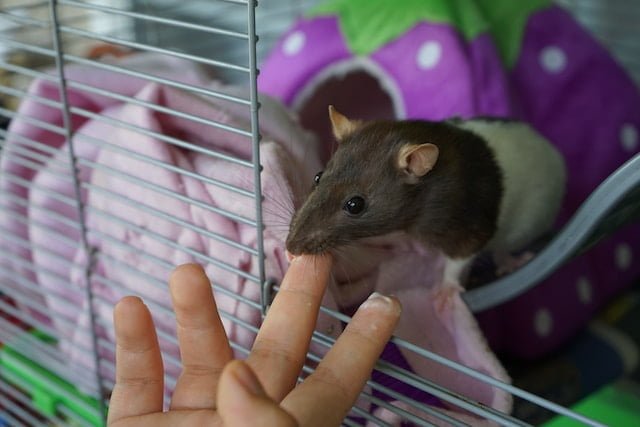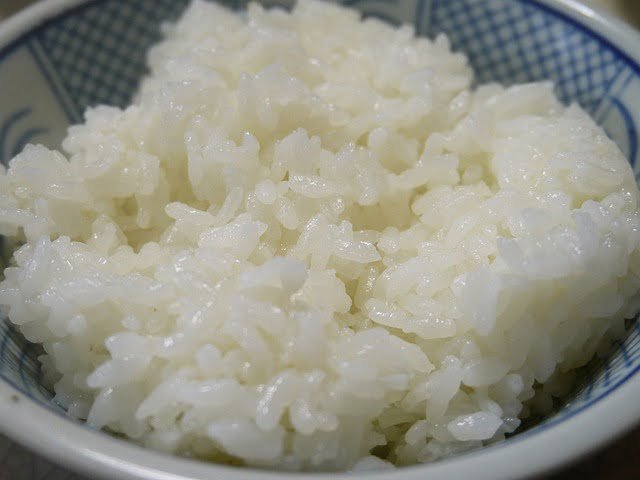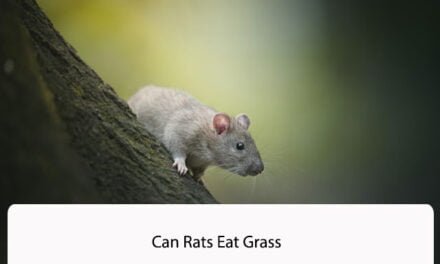Rice is a staple food in many parts of the world, and it is often used as a primary ingredient in various dishes. However, if you are a rat owner, you may be wondering whether rats can eat rice. The answer is yes, rats can eat rice, but there are a few things you need to keep in mind.
Firstly, it is important to note that rats are omnivores, which means they can eat both plant and animal-based foods. Rice is a plant-based food and is safe for rats to consume. However, it is important to ensure that the rice is cooked and not raw. Raw rice can be difficult for rats to digest and may cause digestive problems. Additionally, it is important to avoid giving your rat rice that has been seasoned or contains any additives, as these can be harmful to your pet.
In summary, rats can eat rice, but it should be cooked and not seasoned or contain any additives. As with any food, it is important to ensure that rice is given to rats in moderation and as part of a balanced diet. By following these guidelines, you can safely include rice in your rat’s diet.

Understanding Rat Diet
When it comes to feeding rats, it’s essential to understand their dietary requirements. Rats are omnivores, which means they eat both plants and animals. However, their diet should be balanced to ensure they get all the necessary nutrients.
In the wild, rats eat a variety of foods, including grains, fruits, vegetables, insects, and small animals. As pets, rats should be fed a diet that replicates their natural diet as closely as possible.
A healthy rat diet should consist of the following:
- High-quality rat food: A good rat food should contain a balanced blend of protein, fat, and carbohydrates, as well as vitamins and minerals. Look for a rat food that contains whole grains, seeds, and dried fruits and vegetables.
- Fresh fruits and vegetables: Rats need fresh fruits and vegetables as a source of vitamins and minerals. Some good options include carrots, broccoli, apples, and bananas.
- Protein: Rats need protein for growth and development. Good sources of protein include cooked chicken, eggs, and tofu.
- Treats: Rats love treats, but they should be given in moderation. Good options include plain popcorn, whole-grain crackers, and small amounts of cheese.
It’s important to note that rats should not be fed sugary or fatty foods, as these can lead to health problems such as obesity and dental issues. Additionally, rats should always have access to fresh, clean water.
Overall, understanding a rat’s dietary needs is crucial to keeping them healthy and happy. By providing a balanced diet that includes high-quality rat food, fresh fruits and vegetables, protein, and treats in moderation, you can ensure that your pet rat is getting all the nutrients they need to thrive.
Can Rats Eat Rice?
Rats are omnivores, which means they can eat both plant and animal-based foods. As such, rice is one of the foods that rats can eat. However, it is important to note that not all types of rice are suitable for rats.
White rice is a good option for rats as it is easily digestible and provides them with carbohydrates for energy. Brown rice, on the other hand, is not recommended as it contains phytic acid, which can inhibit the absorption of nutrients in rats.
It is also important to ensure that the rice is cooked and not raw. Raw rice can cause stomach upset and digestive issues in rats. Cooked rice can be served either plain or mixed with other rat-friendly foods such as vegetables or fruits.
In addition, rats should not be fed rice as their only source of food. A balanced diet for rats should include a variety of foods such as fresh fruits, vegetables, and protein sources such as cooked chicken or eggs.
Overall, rats can eat rice as part of a balanced diet, but it should not be their only source of food. White rice is a better option than brown rice, and it should always be cooked before serving to rats.
Benefits of Rice for Rats
Rice is a staple food for many people around the world, but did you know that it can also be a great addition to a rat’s diet? Here are some benefits of feeding rice to rats:
- Source of Carbohydrates: Rice is a great source of carbohydrates, which provide energy to rats. Rats are active animals that need a lot of energy to run, climb, and play, so feeding them rice can help keep them active and healthy.
- Easy to Digest: Rice is easy to digest, which means that rats can absorb its nutrients quickly and efficiently. This can be especially helpful for rats that are recovering from an illness or surgery, as their digestive systems may be weaker than usual.
- Affordable: Rice is a relatively inexpensive food, which makes it a great choice for pet owners on a budget. It is also widely available in grocery stores and online, so it is easy to find.
- Versatile: Rice can be prepared in many different ways, which makes it easy to incorporate into a rat’s diet. It can be boiled, steamed, or even fried, and can be mixed with other foods to create a balanced meal.
Overall, rice can be a great addition to a rat’s diet. However, it is important to remember that rats need a balanced diet that includes a variety of foods, so rice should be fed in moderation and as part of a larger meal.
Potential Risks of Feeding Rats Rice
Feeding rats rice may seem like a good idea, especially if you have a lot of leftover rice in your kitchen. However, there are some potential risks that you should be aware of before you start feeding your pet rats rice.
Firstly, rats are omnivores and require a balanced diet to stay healthy. While rice can be a good source of carbohydrates, it does not provide all the nutrients that rats need. Feeding rats too much rice can lead to nutritional deficiencies and health problems.
Secondly, rice can be a choking hazard for rats. Rats have small throats and may not be able to swallow large pieces of rice. If a rat chokes on a piece of rice, it can lead to serious health problems or even death.
Thirdly, rice can be contaminated with harmful bacteria such as Salmonella and E. coli. These bacteria can cause serious health problems for rats and humans alike. It is important to ensure that any rice you feed your rats is cooked properly and stored safely.
Finally, feeding rats too much rice can lead to obesity and other health problems. Rats are prone to obesity and should be fed a balanced diet that includes a variety of foods in moderation.
In conclusion, while rice can be a good source of carbohydrates for rats, it should be fed in moderation and as part of a balanced diet. Feeding rats too much rice can lead to nutritional deficiencies, choking hazards, bacterial infections, and obesity. It is important to consult with a veterinarian or a rat nutritionist to ensure that your pet rats are getting the nutrients they need to stay healthy.

How to Safely Feed Rice to Rats
Feeding rats can be a tricky business, especially when it comes to their diet. Rats are omnivores and can eat a wide range of foods, including rice. However, it is important to know how to safely feed rice to rats to ensure they receive the right nutrients and don’t suffer from any health issues. In this section, we will discuss some key considerations when feeding rice to rats.
Cooked Rice
When feeding rice to rats, it is important to ensure that it is cooked. Uncooked rice can be difficult for rats to digest, and can even cause intestinal blockages. Cooked rice is easier to digest and provides rats with a good source of carbohydrates.
Rice Quantity
While rats can eat rice, it is important to feed it to them in moderation. Rice should not be the main component of a rat’s diet, as they require a balanced diet of protein, carbohydrates, and fats. Feeding rats too much rice can lead to obesity and other health issues.
When feeding rice to rats, it is recommended to limit the amount to no more than 10% of their overall diet. This can be achieved by including small amounts of rice in their regular food mix, or by offering it as a treat in small quantities.
In conclusion, rice can be safely fed to rats as part of a balanced diet. It is important to ensure that the rice is cooked and fed in moderation to prevent any health issues. By following these guidelines, you can provide your pet rats with a varied and nutritious diet.
Alternatives to Rice in Rat Diet
While rice is a common staple in many rat diets, there are alternative options that can provide similar nutritional benefits. Here are a few alternatives to consider:
Oats
Oats are a great alternative to rice as they are a good source of fiber, protein, and essential vitamins and minerals. Rolled oats or steel-cut oats can be cooked and mixed with vegetables and fruits for a well-balanced meal.
Quinoa
Quinoa is a nutrient-dense grain that is high in protein, fiber, and essential amino acids. It can be cooked and mixed with vegetables and fruits or served as a standalone meal.
Barley
Barley is a good source of fiber, vitamins, and minerals and can be cooked and mixed with vegetables and fruits. It can also be served as a standalone meal or added to other grains for a more varied diet.
Millet
Millet is a gluten-free grain that is high in protein, fiber, and essential vitamins and minerals. It can be cooked and mixed with vegetables and fruits or served as a standalone meal.
Buckwheat
Buckwheat is a nutrient-dense grain that is high in protein, fiber, and essential amino acids. It can be cooked and mixed with vegetables and fruits or served as a standalone meal.
Overall, there are many alternatives to rice that can provide a well-balanced diet for rats. It is important to vary their diet and provide a mix of grains, vegetables, and fruits to ensure they are getting all the necessary nutrients.
Conclusion
After researching and analyzing the information available, we can confidently say that rats can eat rice. However, it is important to note that rice should not be the only food source for rats as they require a varied and balanced diet to maintain good health.
While rice can provide rats with carbohydrates, it lacks essential nutrients such as protein, vitamins, and minerals. Therefore, it is recommended to supplement their diet with other foods such as fruits, vegetables, and lean meats.
It is also important to consider the type of rice given to rats. Brown rice is a better option than white rice as it contains more fiber and nutrients. Additionally, it is recommended to avoid giving rats rice that has been cooked with salt, spices, or other additives.
Overall, rats can eat rice as part of a balanced diet, but it should not be the sole food source. It is important to provide them with a variety of foods to ensure they receive all the necessary nutrients for optimal health.

Frequently Asked Questions
What foods are toxic to rats?
Rats are sensitive to certain foods that can be toxic to them. Some of the foods that rats should avoid include chocolate, caffeine, alcohol, avocado, citrus fruits, and raw sweet potato. These foods can cause serious health issues and even death in rats.
What can rats eat besides rice?
Rats are omnivores and can eat a variety of foods. Along with rice, rats can eat fruits, vegetables, nuts, grains, and meat. It is important to provide a balanced diet for rats to ensure they get all the necessary nutrients.
What nuts are safe for rats to eat?
Nuts are a good source of protein and healthy fats for rats. Some of the nuts that rats can eat include almonds, walnuts, hazelnuts, and peanuts. However, nuts should be given in moderation as they are high in fat.
What vegetables are safe for rats to eat?
Rats can eat a variety of vegetables such as broccoli, carrots, kale, spinach, and sweet potato. It is important to avoid giving them vegetables that are high in oxalates such as spinach and beet greens as they can cause kidney stones in rats.
Can rats eat meat and is it safe for them?
Yes, rats can eat meat as it is a good source of protein for them. Cooked chicken, beef, and fish are safe for rats to eat. However, it is important to avoid giving them processed meat and meat that is high in fat.
What grains are safe for rats to eat?
Rats can eat a variety of grains such as oats, barley, quinoa, and millet. These grains are a good source of carbohydrates and fiber for rats. It is important to avoid giving them grains that are high in sugar such as corn and wheat.





